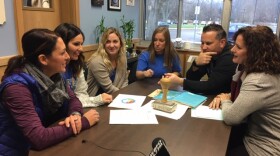A new report finds 29-percent of school superintendents across New York State said their school districts lack enough school psychologists to help students with mental health needs. Surveys were issued to superintendents and school psychologists from the New York State School Boards Association (NYSBA) and the New York Association of School Psychologists. The report is titled Of Sound Mind: Do schools have enough mental health support staff to meet student need?66-percent of the psychologists said they believe there is ‘not enough capacity’ to meet student needs.
Timothy Kremer, executive director of NYSBA, tells WBFO News tells us results vary in different parts of the state. But Kremer points out, with a new state Mental Health Curriculum law in place, they wanted to explore this topic.
“That’s exactly why we decided to do this survey and this report at this time, because we have a new curriculum mandate that will likely, we believe, result in more children as being identified as having some mental disorders, mental issues and willing to come forward and say ‘hey I need some help’ – what we are trying to do is find out where we are at right now,” remarked Kremer.
Survey results among superintendents varied across the state. For example, it was much higher in the Mohawk Valley, where 60-percent of superintendents said there is a shortage school psychologists. In Central New York, 44 percent; Capital Region, 37 percent; St. Lawrence-Black River, 35 percent; Suffolk County, 33 percent; and the North Country, 32 percent.

However, here in Western New York it was much lower, with 21-percent of superintendents surveyed believe there are not enough of psychologists at schools in our region.
Kremer tells us it is a bigger issue for rural school communities.
“The urban areas have a large number of students who have issues and need assistance, but there are resources more readily available in those urban areas and to some extend in the suburban areas. You get into the rural areas – they may have, on a per capita basis, just as many students that are in need of assistance by the resources are just lacking,” Kremer explained.
Kremer also noted some rural districts have difficulty hiring school psychologist.
The survey to school psychologists found many are spending too much time on state and federal requirements, including paperwork, taking away time from providing mental health services directly to students.
“The school psychologist feel the superintendents are not as aware of what’s happening at the building level as it relates to these students. I think the school psychologist fell they are being overworked – dealing with a whole bunch of bureactic activities that don’t involve direct consultation with students who may be in need of assistance and we heard that loud and clear from them – they’re not spending enough time engaged with students and actually performing mental health consultation services – they are spending time doing paper work and meetings,” Kremer remarked.
"The fact that school superintendents throughout New York State are recognizing an increasing need for mental health supports, as well as an increase in the school psychology workforce, represents important steps to addressing this crisis," said NYASP President John Garruto. "The good news is that New York State currently has approximately 3,600 certified school psychologists and 25 school psychology graduate training programs which produce approximately 350 new school psychologists annually. This represents a significant potential workforce to meet the needs of children, youth, and families throughout New York. Through the implementation of the recommendations contained within this report, schools will be in a better position to recruit and retain highly qualified professionals for work in the schools and community."






